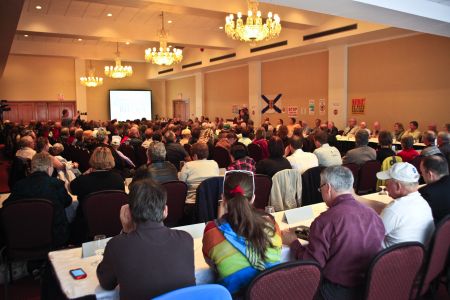K'jipuktuk (Halifax) – 108 different organizations banded together in Halifax today to let provincial politicians know they want salmon aquaculture out of the ocean and onto the land.
“We are asking for a moratorium on open net-pen salmon aquaculture and a re-focusing of the Provincial Aquaculture Strategy,” said Raymond Plourde, wilderness coordinator for the Ecology Action Centre.
Plourde was the M.C. at a press conference held today by the Atlantic Coalition for Aquaculture Reform at the Lord Nelson Hotel. The coalition has united Nova Scotia's environmental NGO's, commercial fisheries, salmon conservation groups, and community groups. Together they are calling on Premier Darrell Dexter and the NDP government to stop approving new aquaculture sites.
The coalition also calls upon the government to use precaution, scientific review, and community consultation to make sound decisions and not "figure it out as they go."
Lewis Hinks, biologist and regional director of the Atlantic Salmon Federation, challenged the aquaculture industry position that Atlantic salmon aquaculture does not harm wild fish with what he called the “Big Three” harmful effects of open net fish farming: escapes, sea lice and disease.
“Escapes happen” said Hinks. In 2010, the aquaculture industry reported 230,000 Atlantic salmon escapees into the Inner Bay of Fundy alone. The area naturally supports around 40,000 salmon in its 32 rivers but has dropped to only 200 wild individual fish returning in recent years.
The escapees compete with wild fish for room in the rivers, and interbreeding leads to the loss of local adaptations that can last for generations. Atlantic Salmon return to their home river every year to spawn and carry genes that match them to their river.
Hinks pointed to the colouration of juvenile salmon and the ability to blend into their surroundings and avoid predators as one characteristic compromised by interbreeding with generic escaped farm salmon.
A second concern is regarding the salmon pest, sea lice, which can become prolific in a salmon farm environment with so many fish together in a small area. Hinks stated that salmon are twice as likely to survive to maturity if they are free of lice.
Having open-net fish farms in the same bays that wild salmon traverse on their way out to sea exposes the wild fish to any pests breeding on the farmed fish. Sea lice are much smaller than the nets separating the farmed fish from their wild companions and can easily infect any young salmon swimming past.
The third main threat from aquaculture to wild stocks, says Hinks, is the spread of disease, which he compares to the spread of a cold in the classroom (inevitable).
The hundreds of thousands of fish held in a small area completely open to the rest of the marine environment is the main issue for the groups united in their opposition of open net-pen salmon aquaculture. This industry model creates a place for pests and disease to multiply unconstrained amongst the multitudes of host fish. It causes pollution through feeding, vaccinating and maintaining so many fish as excess food, feces and pesticide fall to the ocean floor.
This is why the coalition is calling for closed containment farming that is biologically secure; completely separating farmed fish and their fallout from wild, delicate, ecosystems and threatened fish populations.
Plourde appealed to the aquaculture industry in his speech: “we are not your enemy,” he said. He called for industry to acknowledge these problems and to fix them.
Land-based aquaculture systems already exist in Nova Scotia, including a site located at the Millbrook First Nation that produces Arctic Char, without the ecosystem consequences of ocean farms.
The land-based system recycles some of the fish feces into plant food for a neighbouring greenhouse, and the remainder goes into the municipal sewage system. All of Hinks' “Big Three” harmful effects from aquaculture are avoided with land-based systems, and the costs are borne by the producer, not the ocean and wild fish.
Other speakers at the event were from affected communities. Darlene Norman is from the community action group "Friends of Port Mouton Bay" where they have experienced salmon aquaculture for 20 years. Norman described the shift from a functional marine ecosystem, and vibrant lobster fishery, to one where lobster traps come up covered in slime algae and the shellfish species; kelp, eelgrass and Irish moss habitat have disappeared from the shores.
The Port Mouton farm lay fallow (with no fish) for 3 years. During that time, the community group conducted numerous tests, led by oceanographer and resident, Dr. Ronald Loucks. Norman says the group acted in good faith, under the impression that with the proper information government would act to protect Port Mouton Bay.
She describes handing in dozens of scientific reports to the government, that were subsequently ignored.
“Science does not prevail when it comes to industry in 2012,” says Norman. The Port Mouton farm site is now under new ownership and is set to re-start production immediately.
Plourde describes an alternate vision for Aquaculture in Nova Scotia. “We could be a world-leading marine district developing global solutions to global problems instead of following the mistakes of others,” says Plourde.
![Raymond Plourde of the Ecology Action Centre gives a failing grade to Nova Scotia's Aquaculture Strategy. [Photo: Miles Howe] Raymond Plourde of the Ecology Action Centre gives a failing grade to Nova Scotia's Aquaculture Strategy. [Photo: Miles Howe]](../../../sites/mediacoop.ca/files2/mc/imagecache/page450/img_5127.jpg)



